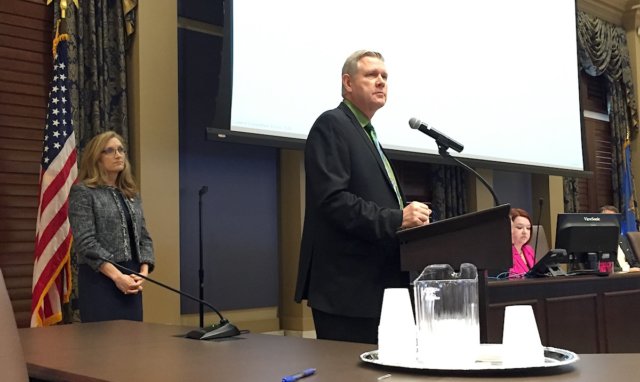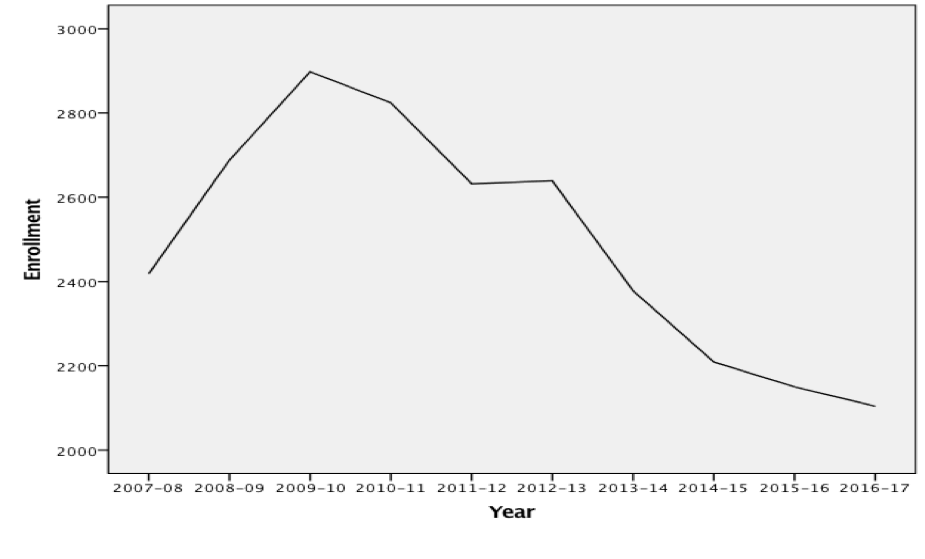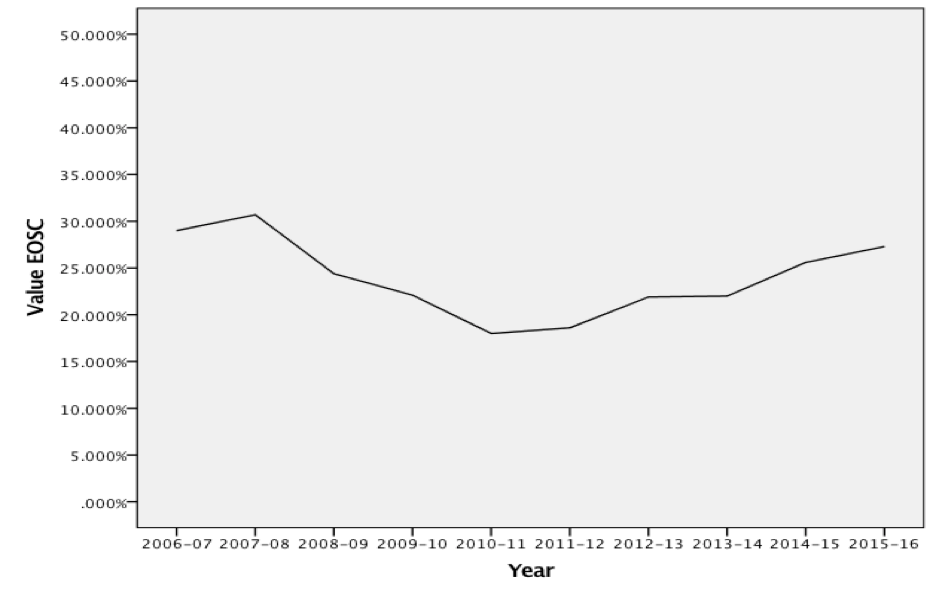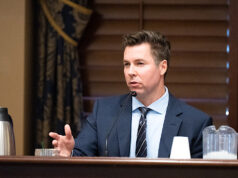

A nominee of Gov. Kevin Stitt to the Eastern Oklahoma State College Board of Regents failed in the Senate Education Committee this morning on a 5-8 vote. Tulsa attorney Cheryl Baber, a former Republican House candidate who said she is considering a 2020 State Senate candidacy, said afterward she was surprised by the result.
“I am disappointed. But I understand — I guess — where they’re coming from now,” Baber said. “I didn’t anticipate that many questions. I didn’t anticipate the range of questions. Perhaps I should have. It has been a privilege to be nominated nonetheless.”
During those questions on her nomination, Baber revealed another surprise. Sen. J.J. Dossett (D-Owasso) asked Baber if she had ever been to the Eastern Oklahoma State College campus in Wilburton or whether she had any other connection to the school.
“I have no connection to this campus, which is why it was a surprise to me when I received the nomination,” Baber said. “I filled out the application (for serving on state boards) after the governor was elected. I didn’t check any agency. I just said, ‘Wherever you think my education and my experience would be a best fit, I’m willing to serve.’ I didn’t think I was going to get tapped for anything.”
Sen. Dewayne Pemberton (R-Muskogee) said more people than just Baber raised eyebrows at her nomination for the EOSC board.
“Would you be surprised to know that the senator from that area did not know about your nomination until last night?” Pemberton asked Baber, referencing Sen. Larry Boggs (R-Wilburton).
Baber replied: “I’d be surprised.”
“Don’t be surprised,” Pemberton said.
Sen. Gary Stanislawski (R-Tulsa) carried Baber’s nomination and said if anyone was to blame for senators’ ignorance, it would be him.
“I would put that on the sponsoring senator,” he said in response to Pemberton.
Later in his office, Boggs confirmed he had not heard of Baber’s nomination until Monday night.
“I understand Gov. Stitt has the right to appoint. I don’t disagree with some of his opinion about [a board] not being all local,” Boggs said. “Sometimes local, we fight, fight, fight amongst ourselves at the disadvantage of the college and what we’re trying to fix. So someone with an outside perspective may be better.”
A rancher whose family ranch has been near Wilburton since 1949, Boggs said the EOSC board is already split on how much emphasis agriculture should receive at the two-year school.
“Eastern, to me, has always been an ag school. And depending on which side of the fence you’re on, the college has moved away from agriculture education,” Boggs said. “That’s where the fight is.”
Follow @NonDocMedia on:
Baber: ‘I see a bit of a declining enrollment’
The rejection of Baber’s nomination as a Tulsan to a rural Oklahoma college also underscores tensions in the state’s higher education world. The State Regents for Higher Education have been pursuing their own voluntary realignment of smaller regent boards through their 2018 task force Report on the Future of Higher Education.
The Stitt administration has been hearing from other state stakeholders who believe declining enrollments and graduation rates at many smaller colleges and universities are unsustainable. Baber identified those issues when asked by senators what challenges she saw for EOSC.
“I see a bit of a declining enrollment, so I’d like to see what could be done to increase retention rates and maybe get the graduation rates back up,” Baber said.
With about 2,100 students, EOSC has seen its overall enrollment decline 13 percent in the past decade, according to data available from the Oklahoma State Regents for Higher Education. Beyond its main location in Wilburton, the college has campuses in McAlester, Antlers and Idabel.


Harder: Boards struggle to find ‘incentive to think differently’
During the committee hearing, Baber received questions about the college’s agricultural division.
“Today is the first time I’ve really heard that there is an emphasis on that,” she said. “I guess I will look to see what people have been wanting and what the community wants.”
What local communities want and what state leaders believe should be done to streamline Oklahoma’s massive higher education landscape do not always align. With money flowing through the Regents for Higher Education, Oklahoma funds 25 public colleges and universities with 49 campuses, an expansive footprint that entices some to call for consolidations but leaves few lawmakers willing to support the decentralization of college administrations.
In an interview on the topic in April, Deputy Secretary of State Donelle Harder said the Stitt administration has been meeting weekly to address its appointments across more than a dozen higher education boards. In all, an Oklahoma governor has appointing authority over 155 regent or trustee board positions, according to data provided by Harder (embedded below).
“What’s interesting is the governing roles around who we appoint where — we have to appoint locals to oversee these universities or branches or two-year colleges,” Harder said. “There’s never going to be an incentive to think differently about that because they are rightfully thinking in the best interest of their neighborhood.
“That’s their identity.”
Harder said Tuesday that the governor’s office would be examining what happened in committee before commenting, though she emphasized that Stitt met his duty of submitting all executive nominations by May 1.
https://nondoc.com/wp-content/uploads/2019/05/HIGHER-EDUCATION-GOVERNING-BOARDS-SUMMARY.pdf” height=”450px” download=”all”]EOSC president: ‘We serve students from all over the state’
Eastern Oklahoma State College President Stephen Smith said he was also surprised that Baber’s nomination failed Tuesday.
“You know, I was surprised when I got the phone call from the governor’s office (with her nomination),” he said. “But it’s not unprecedented at Eastern (Oklahoma State College). When I first started working there, we had a board member from Edmond.”
Smith said he first met Baber earlier in the morning, but he said he did not see a problem with her residence outside of the college’s immediate geographical vicinity.
“We are designated for southeast Oklahoma — 10.5 counties — but we receive taxpayers’ money,” Smith said. “We serve students from all over the state. So having someone from outside that immediate area is not a negative thing. (…) “I always come up and support our nominees, whomever they are. But the process didn’t make it all the way through, so we will see what the governor does next.”
Asked if the governor’s office gave her a sense of Stitt’s goals for Eastern Oklahoma State College, Baber was direct.
“Not really, no,” she said. “I hope they find someone on the board who will do a great job. I thought I would, but obviously the senators thought there would be somebody else who would do a better job. Hopefully they will find that person soon.”
Senators who voted in favor of Baber were: Stanislawski, Sen. John Haste (R-Broken Arrow), Sen. Carri Hicks (D-OKC), Sen. Marty Quinn (R-Claremore), Sen. Joe Newhouse (R-Broken Arrow).
Senators who voted against Baber were: Pemberton, Dossett, Sen. David Bullard (R-Durant), Sen. Tom Dugger (R-Stillwater), Sen. Allison Ikley-Freeman (D-Tulsa), Sen. Roland Pederson (R-Burlington), Sen. Paul Scott (R-Duncan) and Sen. Wayne Shaw (R-Grove).
Boggs does not serve on the Senate Education Committee.

State Board of Education nominees confirmed.
Earlier in Tuesday’s meeting, Stitt’s four nominees to the Oklahoma State Board of Education advanced. Estella Hernandez’s nomination advanced 13-3 and Jennifer Monies’ nomination moved 10-6. Brian Bobek and Kurt Bollenbach each advanced 15-0.
(Correction: This story was updated at 8:30 a.m. Wednesday, May 15, to reflect Sen. John Haste’s district accurately. NonDoc regrets the error. It was updated again to reflect a more accurate count of colleges and universities funded by the state of Oklahoma.)




















